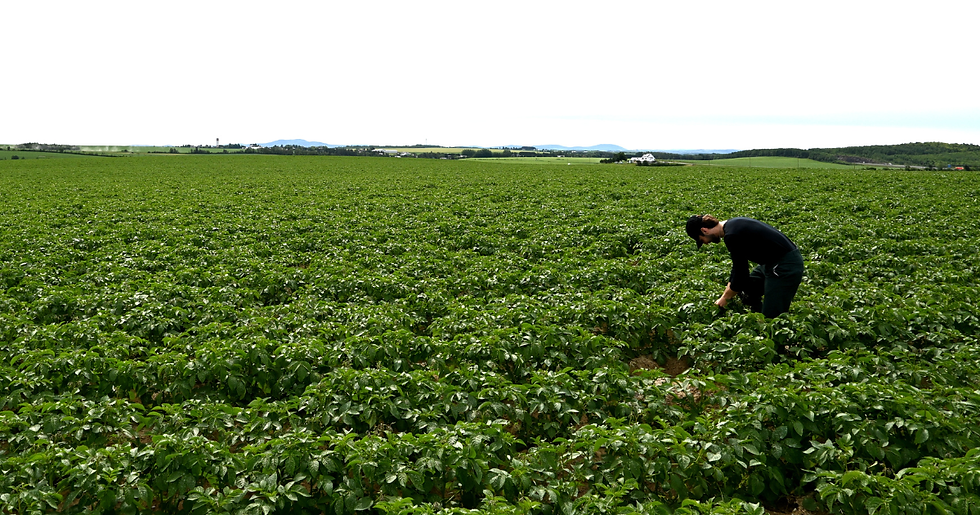Navigating Unpredictable Growing Seasons: Leveraging the Picketa LENS for Optimal Nutrient Management
- Alexa Campbell

- Mar 25, 2024
- 3 min read
As most of Canada experiences unprecedented shifts in winter weather patterns, with abnormally low snowfall amounts and warmer winter temperatures, potato growers face new challenges in optimizing crop nutrition and productivity. Fluctuations in temperature and water availability can significantly impact nutrient absorption in plants, posing risks to crop health and yield potential.
In this blog, we explore the effects of temperature and water on nutrient uptake in potatoes and other crop, and how the Picketa Leaf-Evaluated-Nutrient-System (LENS) empowers farmers to navigate unpredictable growing seasons with precision and efficiency.

Climate change poses significant threats to potato production worldwide, with rising temperatures and shifting precipitation patterns altering growing conditions. Warmer winter temperatures and reduced snowfall, as observed in Canada this winter, can lead to earlier snowmelt and increased evaporation rates, resulting in soil moisture deficits during critical growth stages. These conditions exacerbate water stress in crops, limiting nutrient uptake and compromising overall plant health. Additionally, extreme weather events such as droughts, floods, and heatwaves become more frequent under changing climatic conditions, further exacerbating crop stress and yield losses.
Weather fluctuations play a crucial role in nutrient dynamics in soil-plant systems, influencing soil nutrient availability, plant uptake, and nutrient loss pathways. Temperature variations and water availability can impact soil microbial activity, nutrient solubility, and plant metabolic processes, ultimately influencing nutrient uptake by crops. For instance, warmer temperatures can accelerate nutrient mineralization and increase nutrient uptake rates, but excessive heat can also lead to nutrient leaching and volatilization, reducing nutrient availability in the soil. Conversely, cold snaps can disrupt nutrient uptake processes, leading to nutrient deficiencies or imbalances. Moreover, water stress resulting from erratic precipitation patterns can impede nutrient transport within the plant, exacerbating deficiencies and impacting overall crop health. These weather-induced challenges highlight the importance of adaptive nutrient management strategies to optimize crop nutrition and resilience.
Addressing these Challenges with the Picketa LENS:
Amidst the challenges posed by climate variability, the Picketa LENS serves as a valuable tool for growers seeking to optimize nutrient management and enhance crop resilience. By providing real-time information on the nutrient status of plants, the LENS enables growers to make informed decisions tailored to the specific needs of their crops. By conducting regular scans with the LENS, farmers can identify nutrient deficiencies or imbalances early, allowing for timely interventions. This proactive approach enables growers to make informed decisions regarding fertilizer application and irrigation management, optimizing nutrient uptake and maximizing yield potential. Additionally, the LENS facilitates precision application of fertilizers and irrigation, minimizing nutrient waste and environmental impacts.

What is the Picketa LENS?
The Picketa System LENS is a portable real-time plant analysis tool that estimates the nutrient content for 13 key macro and micronutrients in plant samples. The LENS is currently calibrated to evaluate potato and corn plant tissue, but Picketa Systems is currently working on expanding its capabilities to support an even broader range of crops including canola and onion. Adding this new technology to their workflow, growers can conjure up precise, personalized care for their crops with confidence, nurturing them to reach their full potential. Not only does this new method eliminate the need to send samples to laboratories, saving growers critical time and money, but being able to gather nutrient data sooner will allow growers to make proactive adjustments to fertilization and irrigation regimes, leading to healthier yields and more sustainable practices. For even more information on the LENS or to add one to your operations, contact us at info@picketa.com or through the contact page on website.

Conclusion
As growers confront the challenges of changing climates, the Picketa LENS offers a solution-driven approach to crop management. The LENS serves as a proactive tool for mitigating the effects of temperature fluctuations and water stress on nutrient absorption, empowering growers to optimize yields and sustainably manage resources. By integrating data from LENS scans with weather forecasts and soil moisture measurements, farmers can adjust irrigation schedules and nutrient applications to optimize crop nutrition and minimize yield losses. Additionally, the LENS facilitates continuous monitoring throughout the growing season, allowing growers to track nutrient trends, identify patterns, and implement timely interventions. As growers embrace technologies like the Picketa LENS, they can confidently navigate the complexities of modern agriculture and cultivate thriving harvests in an ever-changing environment.





Comments